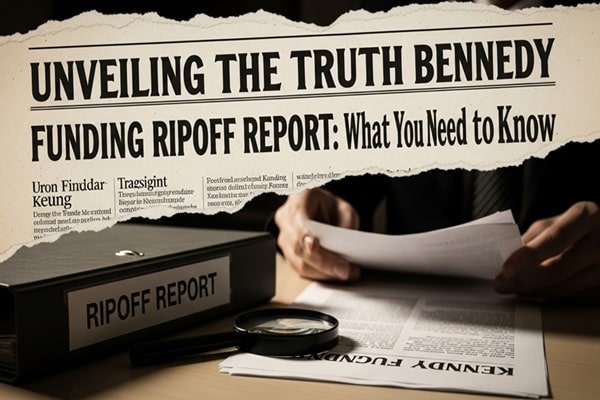Why This Matters: Stay Savvy in Private Lending
Thinking about private lending? You’re not alone. Many people look beyond traditional banks for quick funding. One name that keeps popping up is Kennedy Funding, and not always for the right reasons. Rumors, Ripoff Report posts, and horror stories have circulated—but are they real or just noise?
If you’re considering a private loan or investing in real estate using Kennedy Funding, here’s a friendly guide packed with practical advice to help you feel safe, informed, and ready to take control.
1. What People Are Saying—and What That Really Means
The Allegations
-
Hidden fees & confusing loan terms: Some borrowers say terms popped up unexpectedly—extra charges or fine print.
-
Poor customer service: Stories include long holds, unreturned emails, and feeling left in the dark after signing.
These complaints aren’t unique to Kennedy Funding—they happen in all corners of finance. But that doesn’t mean they’re all legitimate.
Kennedy Funding’s Side of the Story
-
They attribute the complaints to misunderstandings, not shady practices.
-
They state their loan terms are always disclosed up front.
-
They point to positive reviews showing successful client experiences.
-
They invite open communication and encourage deeper research before making judgments.
2. Separating Fact from Fiction
When you see Ripoff Report or similar platforms:
-
Context matters: A single bad experience shouldn’t define an entire business.
-
Be wary of broad statements that rely on emotion instead of details.
-
Check if the complaints are about verifiable facts or just general dissatisfaction.
-
Balance those complaints with independent reviews from sites like Trustpilot, Better Business Bureau, or Google.
3. Know the Risks—Be Ready
Private lending has benefits but also comes with serious risks:
-
Less regulation
-
Private loans aren’t bound by the same consumer protection rules as banks.
-
-
Higher interest rates
-
Short-term gains can become a long-term burden.
-
-
Collateral concerns
-
Loans often need property pledges—defaulting puts that at risk.
-
-
Scam possibilities
-
The private lending space isn’t immune to fraud.
-
Going in with eyes wide open helps you protect your money.
Also Read : Exploring MyGreenBucks: Insights from Kenneth Jones
4. Spotting Red Flags Early
Watch out for:
-
Too-good-to-be-true offers
-
Unbelievably low rates or immediate approval? Be skeptical.
-
-
Pressure tactics
-
Fear-based language like “limited time” or “exclusive offer” should raise questions.
-
-
Lack of clarity
-
Avoid deals with vague terms or hidden fees. Reputable lenders give everything up front.
-
-
Missing transparency
-
Legit companies offer physical offices, licenses, and real contact info.
-
5. Steps to Vet Any Private Lender (Including Kennedy Funding)
-
Read reviews across platforms
-
Use math to judge: for every 10 glowing reviews, expect 1 negative. Don’t base your opinion on just one side.
-
-
Ask for full documentation
-
Your loan agreement should detail interest, fees, repayment terms, and what happens if you miss payments.
-
-
Check their credentials
-
Are they registered in their state? Do they follow consumer finance regulations? Some states require licensing for private lenders.
-
-
Talk to a financial advisor
-
Even a 30-minute consult can reveal red flags and shared tips.
-
-
Keep everything in writing
-
If something is promised verbally, ask for an email or printed confirmation.
-
-
Take your time
-
Don’t sign fast. Legit lenders will give you time to think it through.
-
6. What to Do if You’re Dealing with Kennedy Funding
-
Request specific documents: their full loan agreement, fee schedules, and repayment calculators.
-
Check the contract: Read the fine print before signing—fees, variable rate clauses, late charges.
-
Ask them directly: Clarify anything that seems unclear.
-
Search for local regulations: Some areas require private lenders to register—verify they’ve complied.
-
Request references: Ask if they can connect you with past satisfied clients.
7. Making Smart Choices in Private Loans
Here’s how to protect yourself:
-
Normalize comparison shopping: Compare Kennedy Funding to other reputable private lenders.
-
Ask tough questions:
-
“What’s the total cost of this loan over time?”
-
“Could I face unexpected penalties?”
-
“What exactly is required for me to repay?”
-
-
Run the numbers: A slightly higher interest rate might be better than harsh penalties later.
-
Understand collateral risks: Can you realistically repay without risking your assets?
-
Plan exit strategies: How will you repay early or deal with loan hiccups?
Conclusion: Your Money, Your Control
Private lending—through Kennedy Funding or others—can work, but only if you do your homework. Here’s a recap:
-
Don’t let one negative website sweep you off your feet—look for full answers.
-
Understand the inherent risks—fewer protections mean more responsibility on you.
-
Vet, compare, and question everything—agreement terms, fees, and lender credentials.
-
Keep documentation and stay slow—not rushed.
When you approach private lending with clarity, knowledge, and caution, you can make smart financial decisions that support your goals—not undermine them.












Leave a Reply